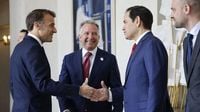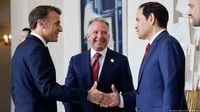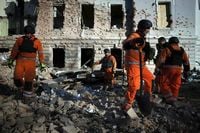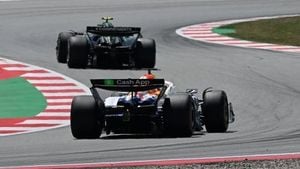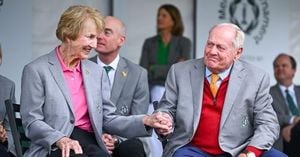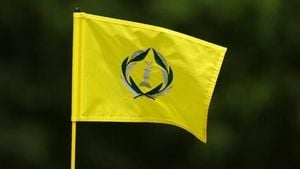On Thursday, April 17, 2025, European and Ukrainian officials convened in Paris with U.S. Secretary of State Marco Rubio and special envoy Steve Witkoff to discuss the ongoing conflict in Ukraine, marking a significant moment in the diplomatic efforts to end the war. This meeting followed weeks of sidelining in President Donald Trump’s strategy, which had focused on direct negotiations with Moscow.
A source from France’s Elysée Palace described the exchange as an "excellent exchange," highlighting the positive interactions between Ukrainian and U.S. officials and their British, French, and German counterparts. The discussions reportedly provided a "very strong strategic opportunity" for all parties involved.
During the talks, a U.S.-authored outline of a peace plan received an "encouraging reception," according to the State Department. Following the discussions, Rubio communicated the same outline to Russian Foreign Minister Sergey Lavrov, reiterating that "President Trump and the United States want this war to end, and have now presented to all parties the outlines of a durable and lasting peace." This sentiment was echoed by Ukraine and its European allies, who expressed their support for Trump’s initiative to bring about a swift conclusion to the conflict.
However, the atmosphere was not without tension. Ukrainian President Volodymyr Zelensky, who did not attend the Paris talks, expressed his discontent with Witkoff, accusing him of "spreading Russian narratives." This criticism underscores the ongoing concern among Ukrainian officials regarding the Trump administration’s approach to the conflict.
Looking ahead, more meetings are scheduled to take place next week in London, continuing the diplomatic dialogue in the same format. French President Emmanuel Macron characterized the Paris talks as a "day of diplomatic mobilisation," emphasizing the need for constructive discussions aimed at achieving both a ceasefire and a comprehensive, lasting peace.
In a separate statement, Trump informed reporters that the U.S. would be "hearing" from Moscow "this week" regarding the U.S. proposal for a ceasefire. He expressed a desire for the violence to cease, stating, "We want it to stop. We want the death and the killing to stop." Yet, despite these diplomatic overtures, Russia has intensified its military actions against Ukraine in recent weeks.
Witkoff, after meeting with Russian President Vladimir Putin for a third time, indicated that any potential peace deal would revolve around the "so-called five territories," which includes Crimea and four other Ukrainian regions currently occupied by Russia. This framing has raised concerns among Ukrainian officials, including Oleksandr Merezhko, a member of Ukraine’s parliament, who remarked that Witkoff might be "inadvertently trying to push pro-Russian narratives."
Despite ambitious pledges from the Trump administration to broker peace, the reality on the ground has been challenging. The administration has faced criticism for its perceived uneven approach to negotiations, often accused of applying pressure on Ukraine while offering concessions to Russia. Following a brief cut in military aid to Ukraine in March, Kyiv quickly agreed to a U.S.-proposed 30-day ceasefire, which has since been undermined by continued Russian aggression.
The Center for Countering Disinformation, a Ukrainian think tank, reported that in the 22 days following the ceasefire announcement, Russian forces killed nearly 2.5 times more Ukrainians than during the same period prior to the truce. This grim statistic highlights the ongoing volatility in the region and the challenges of achieving a sustainable peace.
In the midst of these developments, Trump has urged Russia to "get moving" regarding peace negotiations, although he provided no specific deadlines. Meanwhile, Kirill Dmitriev, a top Russian negotiator, claimed that various nations are attempting to "disrupt" Russia’s dialogue with the U.S., asserting that discussions are taking place under "very difficult conditions" due to ongoing attacks and disinformation campaigns.
As the U.S. navigates its role in this complex geopolitical landscape, European leaders are striving to reassert their influence in the negotiations. Macron and British Prime Minister Keir Starmer have been coordinating efforts to establish a "reassurance force" of international troops, intended to deter further Russian incursions in a post-conflict scenario. However, the Kremlin has dismissed these initiatives as provocations, complicating the already fraught diplomatic environment.
The Paris talks may have provided a critical opportunity for European officials to reintegrate themselves into the stalled negotiations, with hopes of reshaping the dialogue in a manner that aligns with their interests. An EU diplomat noted the importance of how concretely Europeans are involved in future negotiations, emphasizing that their participation will be crucial for any lasting agreement.
In summary, the Paris meeting represents a pivotal moment in the ongoing efforts to resolve the conflict in Ukraine. As diplomatic channels remain open, the stakes are high, and the path to peace remains fraught with challenges. With further discussions on the horizon, the international community watches closely, hoping for a resolution that brings an end to the suffering in Ukraine.
